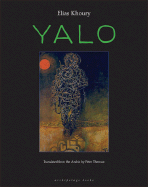
Lebanese writer Elias Khoury's latest novel to be translated into English, Yalo, opens with an interrogation. Yalo, a former paramilitary soldier during Lebanon's tragic civil war of the 1970s and 1980s, has been accused of raping a female acquaintance of his. The novel revolves around the process in which Yalo deals with certain shady events (not necessarily inclusive of the rape accusation), the attempts by his interrogators to beat more confessions out of him, and the psychological effects of such physical and emotional traumas.
Yalo did not understand what was happening.
The young man stood before the interrogator and closed his eyes. He always closed his eyes when he faced danger, when he was alone, and when his mother...On that day too, the morning of Thursday, December 22, 1933, he closed his eyes involuntarily.
Yalo did not understand why everything was white.
He saw the white interrogator, sitting behind a white table, the sun refracting on the glass window behind him, and his face bathed in reflected light. All Yalo saw were halos of light and a woman walking through the city streets, tripping on her shadow.
Yalo closed his eyes for a moment, or so he thought. This young man with his knitted eyebrows and long tan face, his slender height, closed his eyes for a moment before reopening them. But here, in the Jounieh police station, he closed his eyes and saw crossed lines around two lips that moved as if whispering. He looked at his handcuffed wrists and felt that the sun that obscured the face of the interrogator struck him in the eyes, so he closed them (p. 9).
Khoury does not take short cuts here, either in detailing the torture methods (very brutal, such as the case of the cat trained to swipe its claws across the genitals of the prisoners) or with Yalo's confrontration of his past and his conflated understandings of the present and what his interrogators want from him. While some reading Khoury's book might be tempted to make some comparison to Franz Kafka's The Trial, Khoury goes even further in exploring the elastic boundaries of Truth and Remembrance, while working in references to Lebanon's bloody past and present. Yalo's narrative, almost always given in the third person-limited point-of-view, shifts from the past to the present and back again, from memories of his relationships with women to thoughts of betrayals, from the understood Now to the imagined Past. It is difficult at times to discern a linear narrative arc, yet Khoury's method of using a fractured narrative to underscore his points about the traumas inflicted by and upon people works quite well.
In reading this novel, I found myself reflecting more and more on my reactions to Yalo's confessions, my thoughts regarding the society that could produce a Yalo and his interrogators, on my interpretations of what was transpiring. What I concluded was this: Khoury has written a rich, dense narrative that flows sublimely. The more one learns about Yalo, the more questions that arise from these revelations. What is truth? Whence the source of such brutality? The way that Khoury explores these issues made for a read, that while never "light" in tone, which was one of the best I have read this year. Highly recommended for those readers who like a "challenging" read and those who want to study an author's technique for revealing psychological duress.
Publication Date: January 1, 2008 (US); Hardcover.
Publisher: Archipelago Books










No comments:
Post a Comment